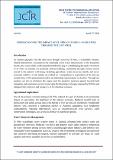Understanding The Impact of El Niño on Zambia: Navigating Through the Dry Spell

View/
Date
2024-04-03Authors
Mwaba, Bernard
Tungay, Grant S.J
Makaha, George Show
Type
ArticleItem Usage Stats
208
views
views
258
downloads
downloads
Abstract
As Zambia grapples with the challenges brought about by the formidable weather phenomenon, El Niño, characterized by warm ocean temperatures in the Equatorial Pacific, the nation faces the daunting reality of a prolonged dry spell. This article delves into the intricate complexities of El Niño's repercussions on Zambia, with a focus on its profound implications for agriculture, a cornerstone of the country's economy. Through an analysis of the multifaceted effects on crop yields, food security, and livelihoods, we explore the urgent need for proactive measures to mitigate and adapt to the challenges posed by reduced rainfall. We highlight the vulnerabilities faced by smallholder farmers and advocate for interventions such as drought-resistant crop varieties, water conservation techniques, and access to alternative livelihood options to safeguard the resilience and prosperity of the Zambian populace.
Description
In this article by the Jesuit Centre for Theological Reflection (JCTR), readers are presented with a comprehensive examination of the impact of El Niño on agriculture in Zambia. The article begins by outlining the characteristics of El Niño and its manifestation as a challenging dry spell in the country. It then delves into the far-reaching consequences of reduced rainfall on agriculture, emphasizing its significance as the backbone of Zambia's economy. Through an exploration of the vulnerabilities faced by smallholder farmers, the article underscores the necessity for proactive measures to address these challenges. Suggestions for interventions, including the adoption of drought-resistant crop varieties and water conservation techniques, are presented as essential strategies to mitigate the adverse effects of El Niño and ensure the resilience and prosperity of Zambia's agricultural sector.